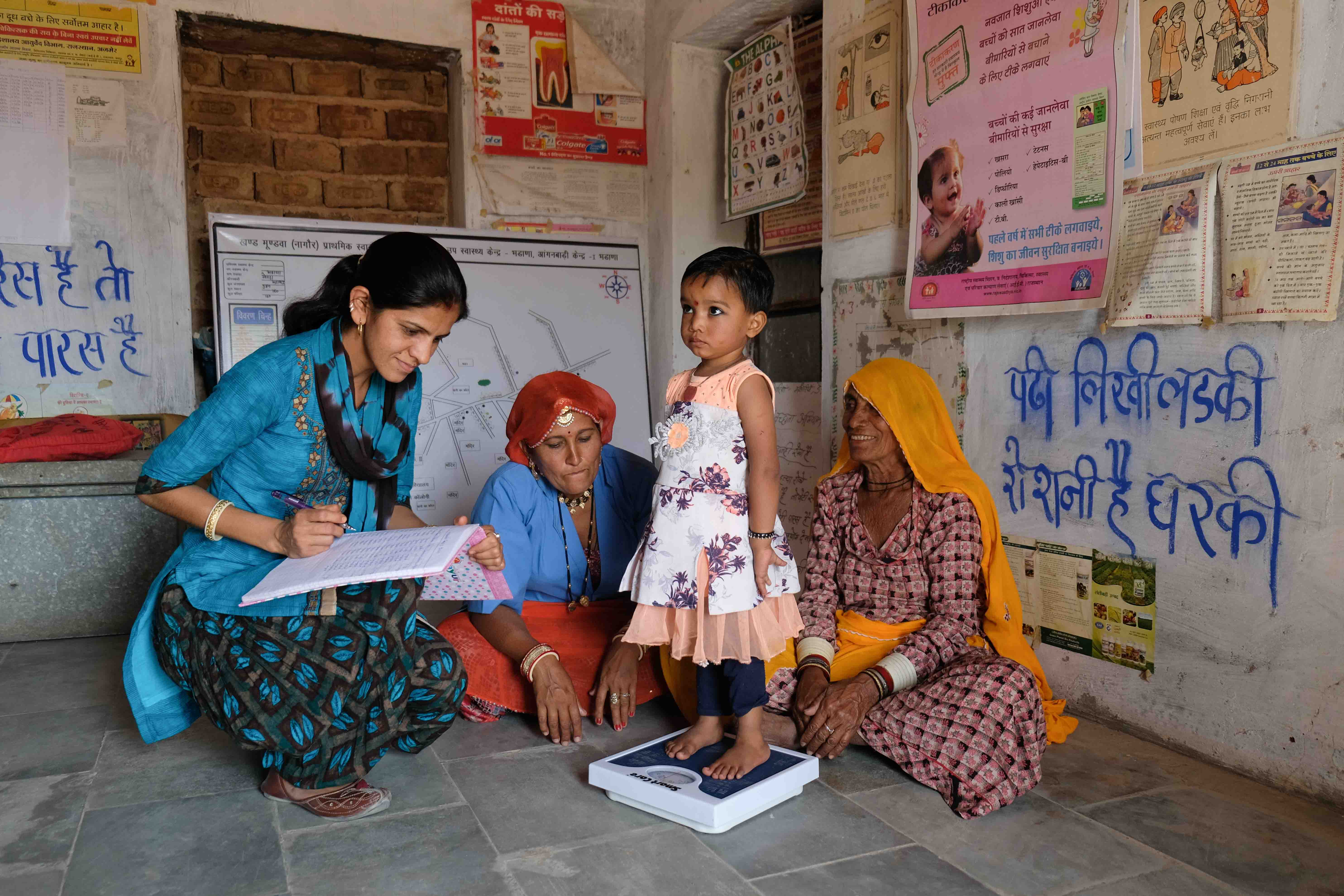Proper nutrition till 5 years of age is the foundation to a
healthy all rounded life. In a report published by UNICEF, 69% of deaths under
the age of 5 was attributed to malnutrition. Given this alarming scenario, ACF
kickstarted its program to tackle malnutrition in 2018 – piloting the program
in Dadri, Uttar Pradesh to improve the health indicators and overall
nutritional status of children. In partnership with the government’s Integrated
Child Development Scheme (ICDS) scheme, what started with 30 anganwadi
centres has now expanded to 50 Anganwadi centres across 12 villages reaching more than 5000 children. With the success of the pilot program, ACF is
now expanding the malnutrition initiative to 9 locations: Chandrapur, Farakka,
Sankrail, Marwa Mundwa, Rabriyawas, Bhatapara, Chirawa, Ambujanagar and Roorkee
targeting more than 100 villages, 200+ Anganwadi centres and about 12,000
children.
In developing this program, ACF aligned with the government’s campaign to address malnutrition – ‘POSHAN ABHIYAN.’ The approach is twofold. First, to create community sensitization through group meetings conducted for various stakeholders and second to strengthen Anganwadi centres, facilities, and build the skills of frontline workers on data recording, analysis and improved nutrition practices.

ACF facilitates the Village Health and Nutrition Day where
all registered beneficiaries are mobilized for Antenatal Care/Post-natal Care
check-ups and vaccinations at Anganwadi centres. Celebrated on the 8th
of every month, health awareness sessions now also include about malnutrition
which are shared with Anganwadi workers (AWWs), ASHAs, Self-Help Groups,
(SHGs), adolescents groups, Mother’s Group and community stakeholders. Sessions
include training on technical content, nutrition practices, menstrual hygiene
management and nutrition. IEC tools like posters of 1000 days interventions,
anaemia and child feeding practices with special focus on High Risk Children
are available at the centres. Behavior change communication and kitchen garden
practices are also encouraged. ACF plays a major role in building the skills of
Anganwadi workers on data recording and providing hand-holding support from time
to time.
In order to equip Anganwadi centres, ACF ensures appropriate
measurement instruments to measure height & weight are provided like MUAC
(mid-upper arm circumference) tape and equipment to track other important
nutrition parameters. For children between the age of 3-6 years, ACF supports
the Anganwadi workers in monthly data recording and calculates their grades.
The unavailability of these instruments leads to poor record keeping, where
children in need of urgent attention for malnutrition go unidentified. Wall
paintings, growth chart posters and WASH structures are also put up in these
centres. The Anganwadi Workers are trained on the use of MUAC tape to identify
the Severely Acute Malnourished (SAM) children - referring them to the
Nutrition Rehabilitation Centre (NRC).
The program also focuses on AAA Integration – ASHA – AWW –
ANM with plans to focus on access to antenatal and postnatal care and
immunization services, high risk babies with low birth weight and knowledge on
breastfeeding and complementary feeding.
Each child at the Anganwadi centre is examined by a pediatrician at least once a year. When a malnourished child is identified, he/she is referred to the NRC. The child remains at the NRC for a period of 14 days where their nutrition needs are addressed. In 2021, 1108 children were identified with low MUAC recording. However children identified as undernourished has reduced from 32.87 to 30.14 in just two years. Volunteers visit high risk children monthly and track their progress.

As part of this program, emphasis is also placed on
families to start kitchen gardens in their backyards where they can grow organic vegetables and
fulfill the nutritional needs of their children. Awareness is created and seeds are provided to families at household levels and development of kitchen garden at the Anganwadi centre is also encouraged. Based on nutritional analysis of children's dietary requirements, research and practices, ACF has formulated a food-grain based nutritious powder which is now produced in a very hygienic manner by the Self-Help Groups. The pilot study has shown good results and is being received well by both the families and the district's ICDS department. The formula is simple and can be
made in any kitchen using food grains.
ACF has also introduced Community Based Management for Acute
Malnutrition wherein ACF encourages community participation to strengthen
various initiatives under the malnutrition program. It has aimed to start a
Nutrition Knowledge Center to support this program. It will include a library,
components on building a kitchen garden, nutritious recipe books, nutritious
powder development and dietary recommendations, and nutrition counselling
session for various stakeholders.
Inspite of the lockdown, maximum number of beneficiaries
especially mothers were reached through mobile platforms like WhatsApp and online sessions were also organized. Inspite Anaganwadi Centres being closed, ACF has ensured that supply of Ready to Use Therapeutic Food (RUTF) and food packets are reaching homes of beneficiaries on a monthly basis. Once the current situation eases with more mobility, ACF intends to commence with mapping more Anganwadi workers, beneficiaries and create community dialogues, partner with more district ICDS departments and conduct baseline data collection to further strengthen the program.
Looking for a CSR Implementation partner in rural
healthcare? Reach out Dr. Vinayak Sonawane (Vertical Head – Health) at
vinayak.sonawane.ext@ambujafoundation.com


.jpg)




0 Comment